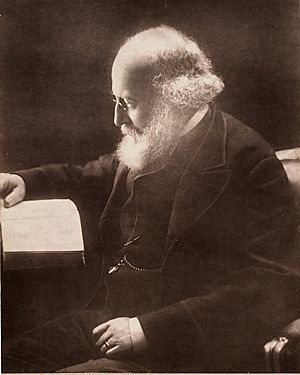Evans Bell facts for kids
Thomas Evans Bell (born November 11, 1825 – died September 12, 1887) was an English officer who served in the Indian army. He was also a well-known writer. He sometimes used pen names like Undecimus and Indicus when he wrote.
Bell's Life and Career
Thomas Evans Bell was the son of William Bell. He grew up and went to school in Wandsworth, London. In 1841, when he was about 16, he moved to Madras, India. There, he started working for the East India Company. This was a powerful British trading company that ruled large parts of India at the time.
Bell believed in secularism. This means he thought that society and government should be separate from religious control. He supported George Jacob Holyoake, who was a leader in the free-thought movement. This movement encouraged people to think freely and question ideas, rather than just accepting them. Bell even spoke at a festival for free discussion in 1851. He also wrote for John Chapman, a famous publisher. Bell was quite critical of the East India Company. He thought they were not fair to farmers in India who owned their own land.
After the Indian Rebellion of 1857, Bell faced some trouble. He lost his job in Nagpur because he complained about how the Ranis (queens) of the Nagpur kingdom were being treated. He went over the head of his boss to do this. In the early 1860s, Bell was the secretary of the Madras Literary Society in Madras. He also edited their magazine, the Madras Journal, in 1861. In this journal, he was the first to correctly guess that Edward FitzGerald was the secret translator of the famous poems, the Rubaiyat of Omar Khayyam.
Bell retired from his job in 1866. He received "half pay," which meant he got half of his usual salary. He was also a member of the London National Society for Women's Suffrage in 1866. This group worked to get women the right to vote. Later, he joined the East India Association. Here, he believed that the British Empire should rule India with trust and fairness. He was also part of the Greek Committee in 1879.
What Did Bell Write?
Thomas Evans Bell wrote many books and pamphlets. Most of his writings were about India and British rule there. Here are some of his works:
- Task of To-day (1852)
- The English in India (1859)
- The Empire in India (1864)
- The Rajah and Principality of Mysore: With a Letter to the Right Hon. Lord Stanley, M.P. (1865)
- The Mysore Reversion (1865)
- Remarks on the Mysore Blue Book (1866)
- Retrospects and Prospects of Indian Policy (1868)
- The Oxus and the Indus (1869)
- The Great Parliamentary Bore (1869) (This book was about how the Nawabs, or rulers, of the Carnatic region and their families were treated.)
- Our Great Vassal Empire (1870)
- Is India a Conquered Country And, If So, what Then? (1870, a short pamphlet)
- Public Works and the Public Service in India (1871), written with Frederick Tyrrell
- The Bengal Reversion (1872)
- Last Counsels of an Unknown Counsellor (1877, he was the editor)
- The Annexation of the Punjaub and the Maharajah Duleep Singh (1882)
- Memoirs of General John Briggs (1886)
Bell's Family Life
Thomas Evans Bell married Emily Magnus (around 1839–1893). She was also a freethinker, like him. Emily was an actor and a talented classical musician. They had a daughter named Ernestine (1871–1959). Sadly, an older daughter had died from a serious illness called typhoid in Barnes, London.
After her parents passed away, Ernestine was cared for by her guardians, William and Hertha Ayrton. Ernestine grew up to be an artist and a writer. She was also a suffragette, meaning she actively worked for women's right to vote. Ernestine married a doctor named Herbert Mills (1868–1947). They both shared similar political views, known as Fabian views, which focused on gradual social change.
 | Charles R. Drew |
 | Benjamin Banneker |
 | Jane C. Wright |
 | Roger Arliner Young |


